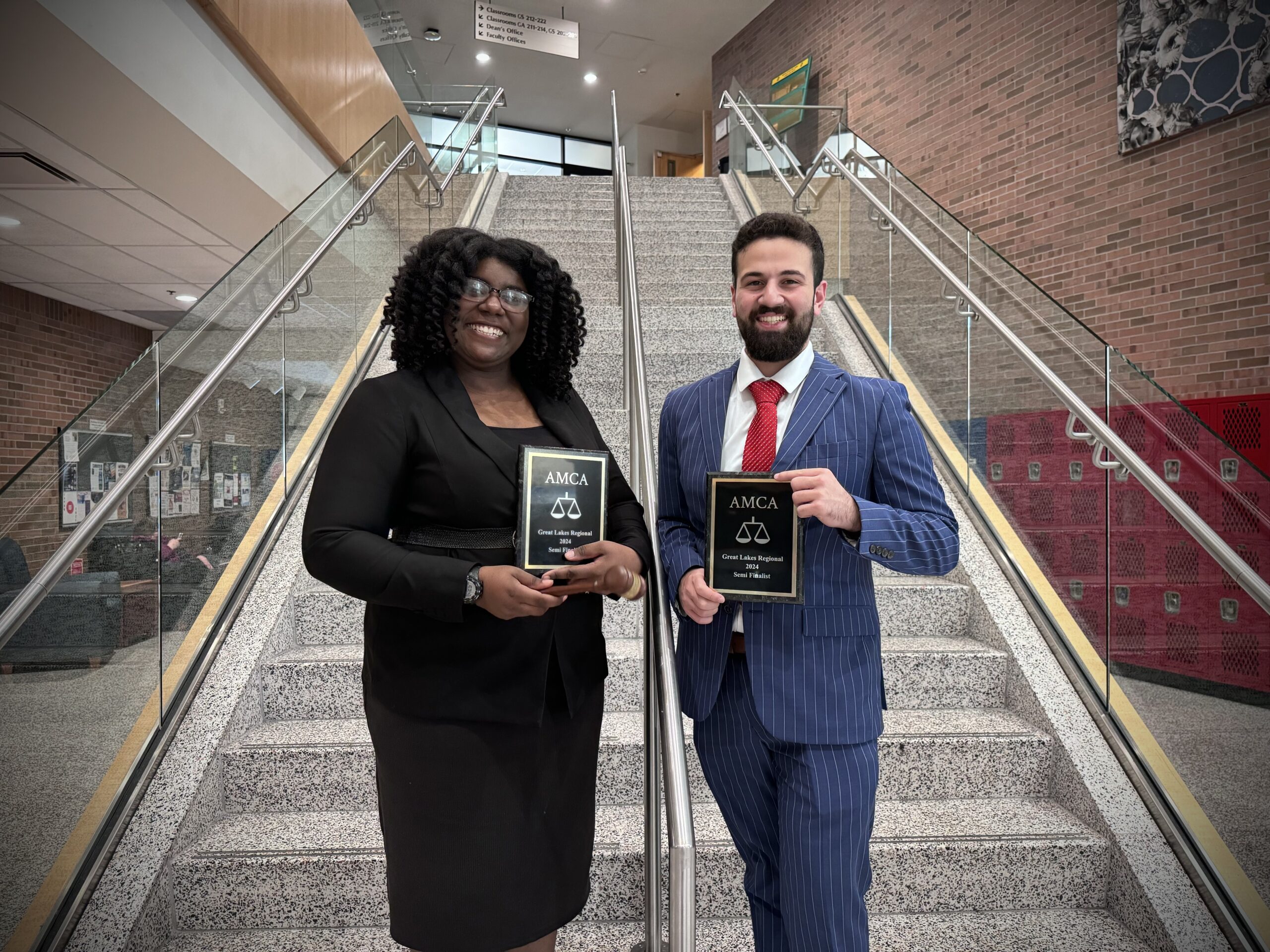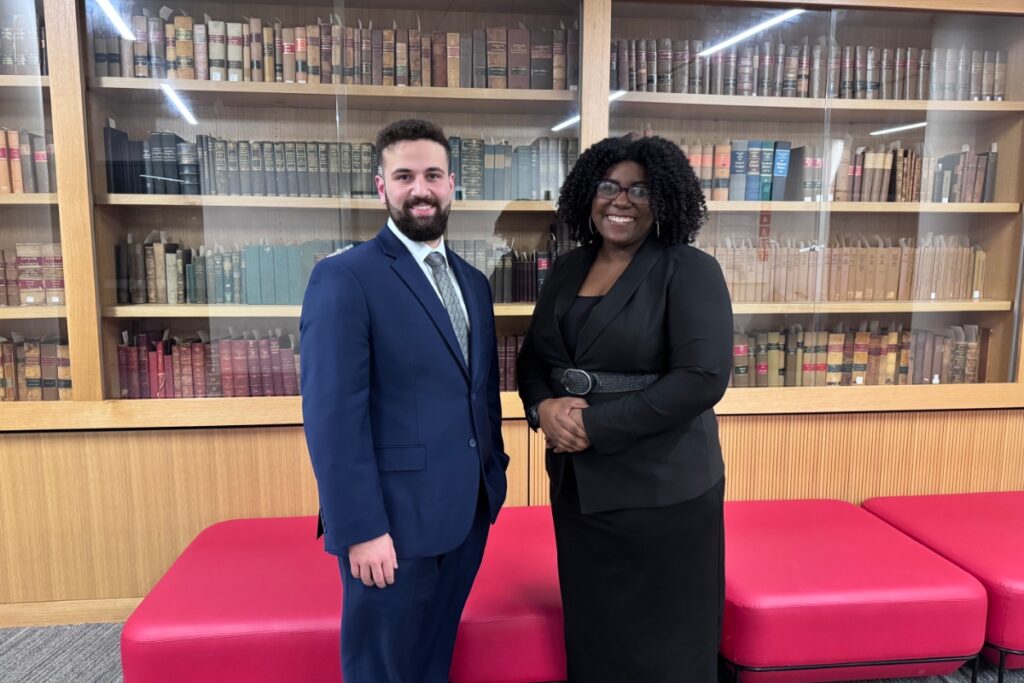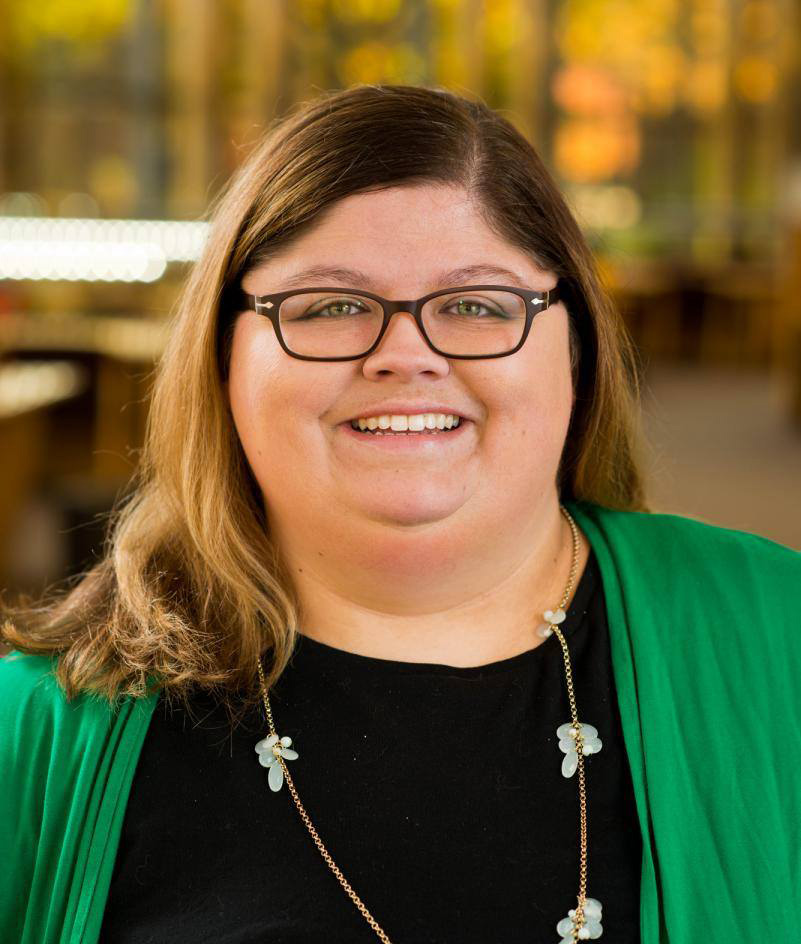Pair of Wolverines rank 12th in American Moot Court Association's national tournament

At the beginning of the 2024-2025 competition season, Kimberly Saks, an assistant professor of political science and the University of Michigan-Flint's moot court advisor, assigned her mooters one goal: to wreck her January.
"The preliminary rounds of the national competition were scheduled to take place in Houston in early January 2025, which would really throw a wrench in my schedule," said Saks. "But I am thrilled about how the entire team competed in November – I don't think we've ever had a set of teams so well-prepared for competition. It's a true feat for a team to make it to the regional semifinals, so making it to nationals is even more impressive! Our moot court team now ranks the highest across all three University of Michigan campuses."
When she founded the program five years ago, Saks couldn't have predicted that in just a few short years – two of which were adversely impacted by the COVID-19 pandemic – UM-Flint's fledgling team would be competing at the national level.
"I wanted to create a chance for our students to enhance their skills and to compete and learn from their peers at other institutions," Saks said. "What's fantastic about the moot court experience as a co-curricular activity is that it is beneficial not only for students interested in pursuing a legal career. Regardless of their major, students acquire essential professional skills such as qualitative analysis, argument development, high-quality writing, and advocating for their viewpoints – all crucial for long-term success."

Sami Kotob, who graduated from UM-Flint with political science and economics degrees in December 2024, recalls how the Great Lakes Regional competition at Saginaw Valley State University laid the foundation for his personal and professional growth.
"Our experience at regionals was phenomenal, primarily because you're in this environment where everyone is really giving their best, they've been working just as hard as we have, and that energy, as well as the competitive element of it, inspired growth in my speaking ability as well as in learning how to respect the work that other people have put in," he said. "This was my second year competing in the regionals, and while winning this year was great, losing last year gave me insight into how I could keep improving year over year. It is an exercise in humility to recognize that 'losing' is essentially a learning opportunity."
For Alyssia Washington, a senior political science major from Flint, her moot court journey has been shaped by her recovery from long COVID, a condition that resulted in severe nerve damage that inhibited her cognitive abilities.
"I first competed in regionals in 2022, and my partner and I, Molly Edinger, made it to the Sweet 16 – we even got a trophy," said Washington. "Unfortunately, I experienced some regression in my symptoms and couldn't compete in 2023, but I forced myself to read the competition cases line by line – basically, it was my rehab. And being able to compete in 2024 was my goal to show myself that my health was improving. When Sami and I qualified for nationals, it was a dream come true. I've always suffered from a bit of an imposter syndrome, so qualifying for nationals showed me that my voice deserves to be heard."
The road from Flint to Houston involved eight months of hard work: reviewing case law, developing arguments, practicing with other mooters, and honing their skills in an internal scrimmage that was judged by UM-Flint Chancellor Laurence Alexander, associate professor of philosophy Bénédicte Veillet, and April 2024 graduate and current Michigan Law student Joseph Bujak.
"The AMCA selects an issue each year that moot court programs nationwide use as a framework," Saks said. "This year, the question was about whether or not someone can be held liable for someone else's death if they encourage them to engage in suicide. There are a lot of intersecting perspectives in a case like this – free speech, the Fifth Amendment right against self-incrimination. Usually, they choose an issue with contemporary value or a recent case that went through the courts to ensure that mooters are arguing real-world issues. That really helps them bring their arguments to life."
After their regional win last November, Kotob and Washington had two months to take the feedback from that competition and improve their arguments for the preliminary national rounds in Houston. The entire moot court team then submitted their written briefs in early January, as those are judged separately. Kotob and Washington's brief earned them top honors, ranking them fifth in the nation amongst all briefs submitted for the respondent's side. That boosted UM-Flint's already stellar record in the written advocacy category, where they earned a national ranking in the 2023-2024 season.
Once in Houston, Kotob and Washington were ranked 12th in the competition after the first day and made it to the playoffs on the second day. Though they were knocked out of the competition, it was a very close round – on one ballot, they lost only by a single point.

"Sami and Alyssia have shown the talent and tenacity of UM-Flint," Saks said. "Not only are they skilled orators, but they are committed to the excellence of their work. They represented the university proudly, and I could not be happier with the result. Our moot court program is strong, and we're achieving results indicative of the grit and intelligence of UM-Flint students. I cannot wait to see what next year brings. It is a lot of hard work, but it certainly pays off."
And for Washington, all that hard work has paid off in not only accolades from the moot court community, it has reframed her perspective.
"Moot court has taught me a valuable lesson: nothing is impossible," she said. "It helped me regain my voice and mind from long COVID aphasia and neurological damage. It's helped me regain my confidence. I'm not scared of challenges anymore. Now, I rise to them. After Houston, I came back and gave myself permission to start striving towards a Ph.D. and be the first in my family to do so. No more fear or doubt. Moot court showed me that I can do anything I set my mind to."
Related Posts
No related photos.
Kat Oak
Kat Oak is the communications specialist for the College of Arts, Sciences, and Education. She can be reached via email at katheroa@umich.edu.